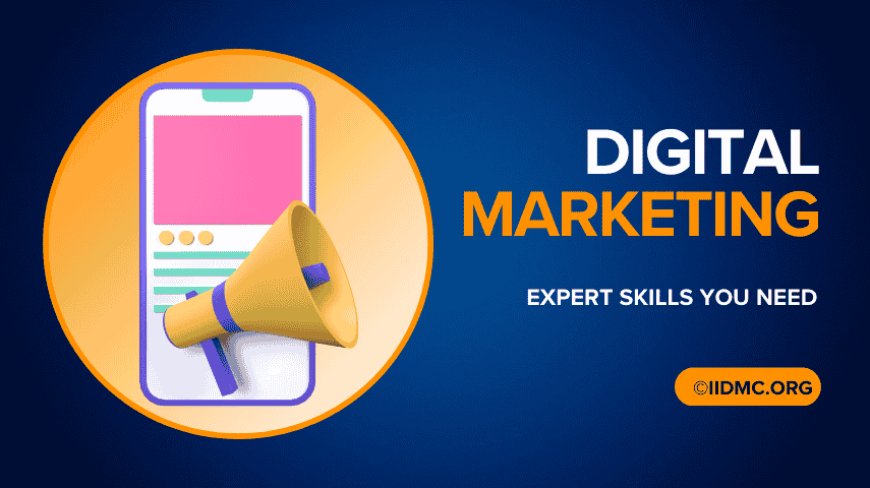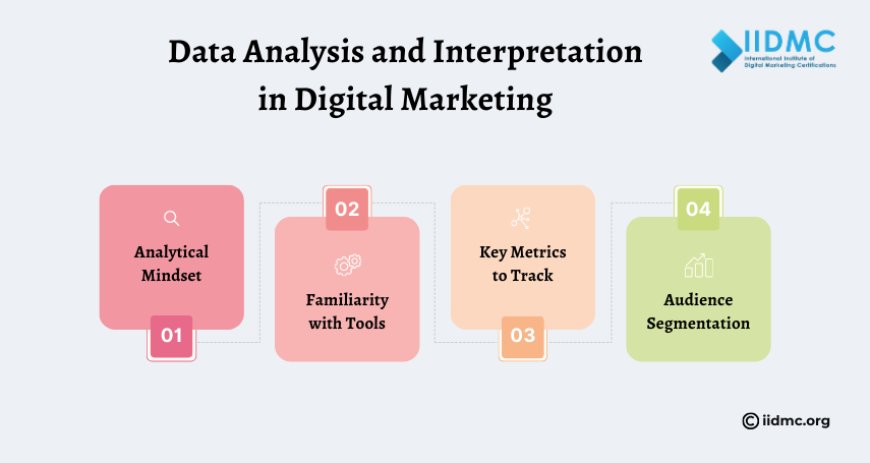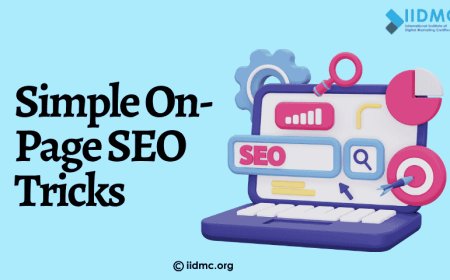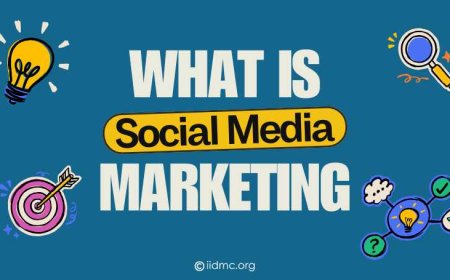Digital Marketing Expert Skills You Need
Discover the essential skills every digital marketing expert needs to succeed, from SEO and content creation to data analysis, adaptability, and strategic thinking. Elevate your digital marketing game with these must-have skills.

Staying relevant means keeping up with a set of essential skills that go beyond just knowing how to use social media or run a few online ads. Whether you’re aiming to build brand awareness, increase sales, or connect with customers on a deeper level, mastering the right mix of digital marketing skills can open doors to exciting opportunities. From understanding SEO fundamentals and data analytics to mastering the art of persuasive content creation, the skills you need to succeed as a digital marketing expert are varied and always evolving. This guide will walk you through the top digital marketing skills you need to stay competitive and make an impact skills that can help you take control of digital strategies, connect with audiences meaningfully, and make data-backed decisions that drive success. Perfect for students and early-career marketers, this article breaks down each skill in a straightforward way, making it easy to understand what it takes to excel in this field.
Core Digital Marketing Disciplines
To succeed in digital marketing, it’s essential to master a few key areas:
SEO (Search Engine Optimization)
SEO helps content rank higher in search engines, driving unpaid, organic traffic. Basic techniques include keyword research, on-page optimization, and link building, using tools like Google Keyword Planner.
Creating valuable content—blogs, videos, social media posts—attracts and retains audiences. Skills in storytelling and content repurposing make content more engaging and shareable.
Platforms like Instagram, Facebook, and LinkedIn allow brands to connect with unique audiences. Skills in content planning, community management, and tracking engagement help build strong, interactive communities.
Email Marketing
Email is a direct way to reach an interested audience. Personalization and automation tools like Mailchimp improve relevance, making emails more impactful.
PPC and Paid Advertising
PPC, such as Google Ads, and paid social campaigns reach a broad audience quickly. Skills in budgeting, ad creation, and platform insights ensure efficient use of ad spend.
Learning these core skills equips you to create, manage, and optimize effective digital marketing strategies that reach and engage audiences.
Data Analysis and Interpretation in Digital Marketing
A strong foundation in data analysis is essential in digital marketing, enabling marketers to make informed decisions and fine-tune strategies based on real insights. Here’s a breakdown of the main aspects every digital marketer should know about data.
Analytical Mindset
Data-driven decision-making allows marketers to understand what’s working and what’s not, helping to allocate resources effectively. By analyzing trends and patterns, marketers can adjust campaigns to improve results.
Familiarity with Tools
To work effectively with data, it’s essential to know tools like Google Analytics for website insights, Google Search Console for search data, and social media insights for platform-specific metrics. These tools help track user behavior, engagement, and performance.
Key Metrics to Track
Metrics such as Click-Through Rate (CTR), Return on Investment (ROI), conversion rates, and Customer Lifetime Value (CLV) give a clear picture of campaign success. Understanding these metrics helps in setting realistic goals and evaluating performance.
Audience Segmentation
Using data to divide an audience into segments—like age, interests, or behaviors—allows for more targeted campaigns. Segmentation ensures that the right messages reach the right people, making campaigns more effective and relevant.

Technical Skills for Digital Marketing
Basic HTML/CSS Knowledge
Understanding HTML and CSS helps marketers make simple edits on websites, improving user experience without needing a developer.
Website Optimization
Optimizing page load speed and ensuring mobile responsiveness keeps visitors engaged and improves search rankings.
Marketing Automation
Tools like HubSpot and Mailchimp automate tasks like email marketing, saving time and ensuring timely communication with customers.
CRM Integration
CRM tools like Salesforce help track customer interactions, enabling personalized, targeted campaigns based on customer behavior.
These technical skills allow marketers to improve user experience, automate tasks, and create data-driven campaigns.
Creativity and Content Creation Skills in Digital Marketing
Creativity is at the heart of effective digital marketing. Here are key skills that help marketers produce engaging, memorable content.
Visual Design Skills
A basic understanding of graphic design using tools like Canva, Photoshop, or Adobe Spark allows marketers to create visually appealing images, infographics, and ads that attract attention and communicate ideas clearly.
Video Production and Editing
With the rising popularity of video, skills in shooting and editing are essential. Simple video production can be done with a smartphone, while editing tools like Adobe Premiere or even mobile apps make it easier to produce polished content.
Copywriting
Good copywriting is all about writing clear, persuasive text for ads, social media, and websites. Strong copy can capture attention quickly, communicate key messages, and drive action.
Storytelling
Crafting stories that connect with audiences makes content more engaging and memorable. Whether through posts, videos, or articles, storytelling helps build an emotional connection and keeps audiences coming back.
Project Management and Organization Skills in Digital Marketing
Time Management
Managing time well is key to handling multiple projects and meeting deadlines. Prioritizing tasks and breaking down larger projects into smaller steps keeps things manageable and reduces stress.
Familiarity with Project Management Tools
Tools like Trello, Asana, and Monday.com help marketers organize tasks, track progress, and communicate with team members efficiently. These tools make it easier to manage workflows and keep projects on schedule.
Collaborative Skills
Digital marketing often involves working with others, from designers to writers. Being able to communicate effectively, understand workflows, and coordinate resources helps create a smooth, productive team environment.
Goal Setting and KPIs
Setting SMART (Specific, Measurable, Achievable, Relevant, Time-bound) goals and Key Performance Indicators (KPIs) allows marketers to track progress and measure campaign success. This makes it easier to adjust strategies and optimize for better results.
Mastering these skills ensures that marketing projects run smoothly, stay on track, and achieve their intended outcomes.
Adaptability and Continuous Learning in Digital Marketing
In digital marketing, flexibility and a willingness to learn are crucial for keeping skills relevant and effective. Here are ways to stay adaptable and up-to-date.
Keeping Up with Industry Trends
Staying informed about updates to algorithms, new tools, and shifts in consumer behavior helps marketers make informed decisions and adjust strategies to match current trends.
Learning New Tools and Techniques
Embracing new technologies, like AI in marketing, allows marketers to discover better ways to reach and engage audiences. Familiarity with new tools can give a competitive edge and improve campaign performance.
Attending Webinars and Training
Participating in webinars, industry events, and courses offers practical knowledge and fresh perspectives. Ongoing learning through certifications or workshops helps marketers expand their skill sets.
Strategic Thinking and Problem-Solving in Digital Marketing
Strategic thinking and problem-solving are essential for creating successful, long-lasting digital marketing campaigns. Here’s how these skills come into play.
Building Long-Term Marketing Strategies
Strategic planning helps in defining goals and laying out a roadmap for brand growth and audience engagement over time. This approach ensures consistency in messaging and builds stronger connections with the target audience.
Adaptable Problem-Solving Skills
Effective problem-solving means being able to pivot quickly if a campaign isn’t performing well or if market conditions shift. Flexibility in adjusting strategies allows marketers to overcome challenges and achieve better results.
Competitive Analysis
Understanding competitors' strategies helps marketers identify what’s working in the market and where there’s room to differentiate. Regular competitive analysis can provide valuable insights for refining and enhancing marketing approaches.
With strategic planning and adaptable problem-solving, marketers can create campaigns that are both effective and resilient, even in changing conditions.
Digital marketing is a field that requires a blend of technical, creative, analytical, and strategic skills. From understanding SEO, social media, and content creation to mastering data analysis, adaptability, and project management, each skill contributes to a marketer’s ability to create and run impactful campaigns. Continuous learning is key in digital marketing, as trends and tools evolve constantly, challenging marketers to stay updated and refine their expertise.For those passionate about growing in this field, the journey is both challenging and rewarding.
Building and applying these skills allows marketers to connect with audiences, drive business growth, and see the tangible impact of their efforts.For anyone looking to further their knowledge and gain hands-on training, resources like the International Institute of Digital Marketing (IIDMC) offer courses, certifications, and expert-led training programs. Visit iidmc to explore opportunities to build a solid foundation and stay competitive in this dynamic industry.




























